StoreSEO hilft SEO für Shopify-Produkte optimieren damit sie bei Ihren potenziellen Kunden online besser sichtbar sind. StoreSEO stellt sicher, dass alles in Ordnung ist, indem es einen SEO-Score und alle Felder anzeigt, die korrigiert werden müssen, um einen guten SEO-Score für Ihre Produktseite zu erzielen. Erfahren Sie anhand der folgenden Richtlinien, wie StoreSEO Ihnen dabei hilft, die SEO für Shopify-Produkte zu optimieren.
Bevor Sie beginnen, stellen Sie sicher, dass Sie ein Produkt erstellt oder hinzugefügt haben und installierte StoreSEO App zu Ihrem Shopify Store. Befolgen Sie dann diese Schritt-für-Schritt-Anleitung, um herauszufinden, wie Sie die Produktseite mit StoreSEO optimieren können.
Schritt 1: Navigieren Sie zur StoreSEO-Produktoptimierung #
Melden Sie sich bei Ihrem Shopify-Shop an. Wählen Sie dann in der Suchleiste oben oder im MenüApps' in der linken Seitenleiste, suchen Sie nach der StoreSEO-App und klicken Sie darauf. Gehen Sie im StoreSEO-Dashboard zu 'SEO optimierenKlicken Sie nun auf die Registerkarte 'Produkte'-Option.
Stellen Sie sicher, dass Sie alle Produkte synchronisieren, um die Produktliste auf dieser Seite anzuzeigen. Wählen Sie das Produkt aus, das Sie optimieren möchten, und klicken Sie auf 'Problem beheben' Taste.
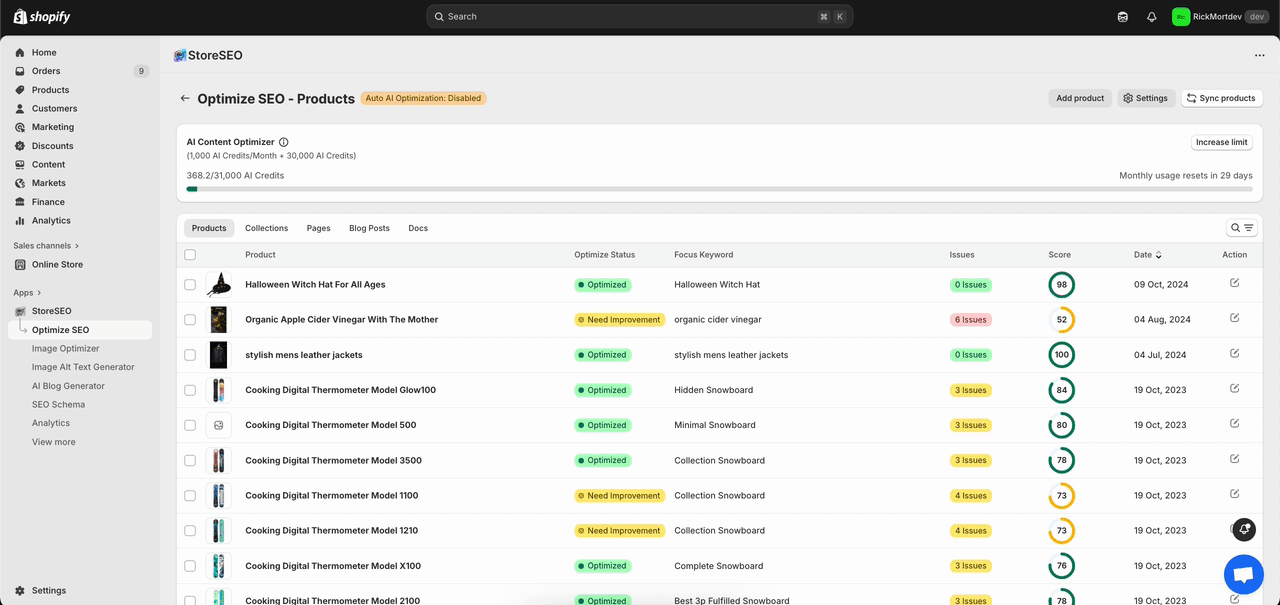
Schritt 2: Shopify-Produkt optimieren #
Jetzt ist es an der Zeit, die SEO für Shopify-Produktseiten. Wie Sie im Bild unten sehen können, werden die SEO-Details Ihres ausgewählten Produkts von StoreSEO angezeigt. Auf der rechten Seite finden Sie außerdem Grundlegende SEO-Analyse Und Detaillierte SEO-Analyse um die Schlüsselfaktoren zu finden, die angegangen werden müssen, um den SEO-Score zu verbessern.
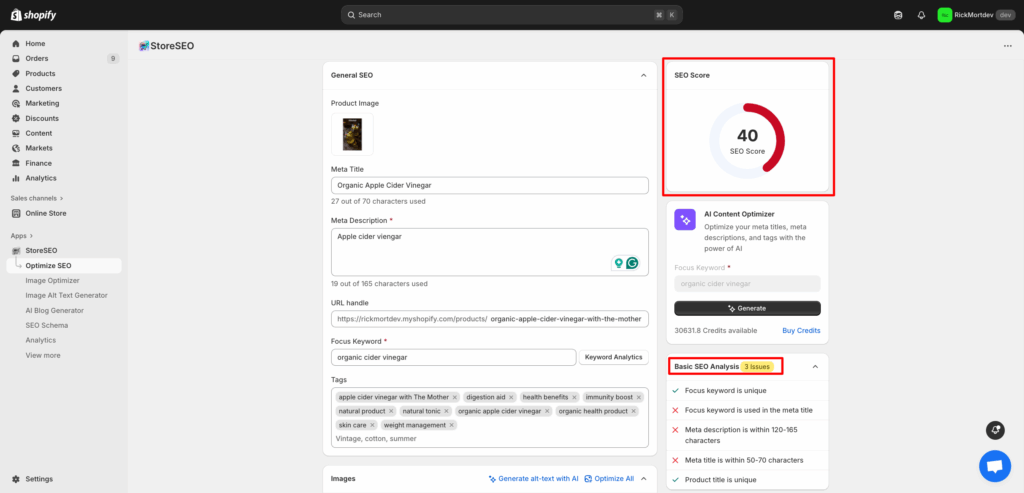
Grundlegende SEO-Analyse #
Beginnen wir mit Grundlegende SEO-Analyse. Dabei müssen wir verschiedene Kriterien sicherstellen, wie z. B. das Platzieren eines eindeutigen Fokusschlüsselworts an den erforderlichen Stellen, die Einhaltung einer optimierten Länge des Metatitels und der Beschreibung und andere. Wir zeigen Ihnen nun, wie Sie dies Schritt für Schritt tun.
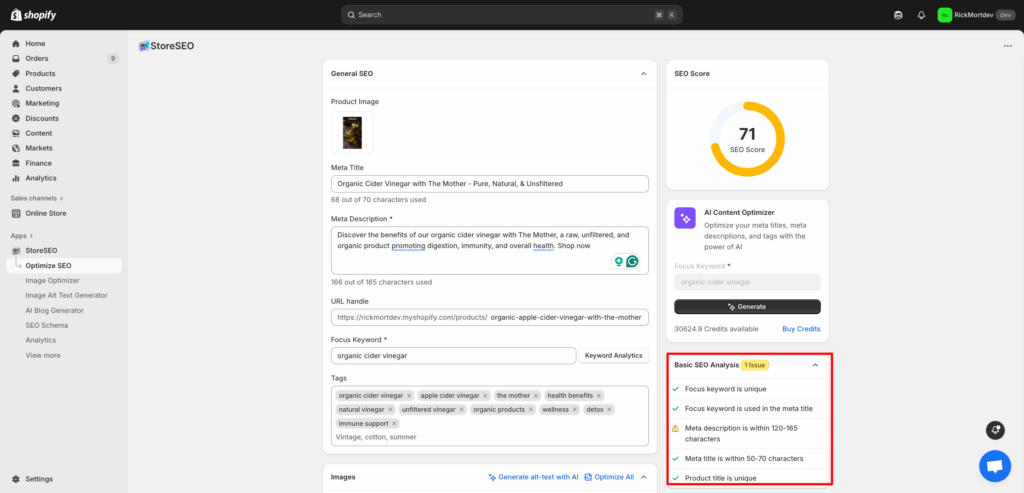
Das Fokus-Keyword ist eindeutig #
Zunächst müssen Sie die richtige Fokus-Schlüsselwort. Dies ist entscheidend, da das Produkt auf Suchmaschinen basierend auf diesem Schlüsselwort indiziert wird. Einfach ausgedrückt: Ihre potenziellen Kunden haben eine höhere Wahrscheinlichkeit, Ihr Produkt zu finden, wenn ihr Suchbegriff und Ihr ausgewähltes Fokus-Schlüsselwort übereinstimmen.
Deshalb müssen Sie sehr vorsichtig sein und die richtige Keyword-Recherche bei der Auswahl des Fokus-Keywords. Hier sind einige Dinge, die Sie beachten sollten:
Keyword-Relevanz: Stellen Sie sicher, dass das Keyword für Ihr Produkt, Ihr Unternehmen, Ihre Zielgruppe und Ihre Nische relevant ist. Angenommen, Sie verkaufen Apfelessig. Ihr Fokus-Keyword sollte für dieses Produkt relevant sein. Nun wählen Sie ein Keyword mit hohem Suchvolumen aus, das den Begriff „frischer Apfel' oder 'Apple iPhone'. Diese Schlüsselwörter liegen außerhalb Ihrer Produktnische. Obwohl sie also möglicherweise ein höheres Suchvolumen aufweisen, sind sie keine relevante Option.
Suchvolumen: Schlüsselwörter mit höherem Suchvolumen werden jeden Monat häufiger gesucht. Wenn Sie Schlüsselwörter mit höherem Suchvolumen auswählen, ist die Wahrscheinlichkeit höher, dass Sie mit mehr Konkurrenz konfrontiert werden. Je spezifischer die Schlüsselwörter sind, die Sie verwenden, desto präziser können Sie Ihre Zielgruppe erreichen.
Wenn Sie nun ein langes Fokus-Keyword wie „original ungefilterter Bio-Apfelessig', Sie haben ein einzigartiges Schlüsselwort, aber es besteht eine geringere Wahrscheinlichkeit, dass Kunden dieses gesamte Schlüsselwort bei einer Suche verwenden. Aus diesem Grund hat es kein gutes Suchvolumen, wie im Bild unten gezeigt.
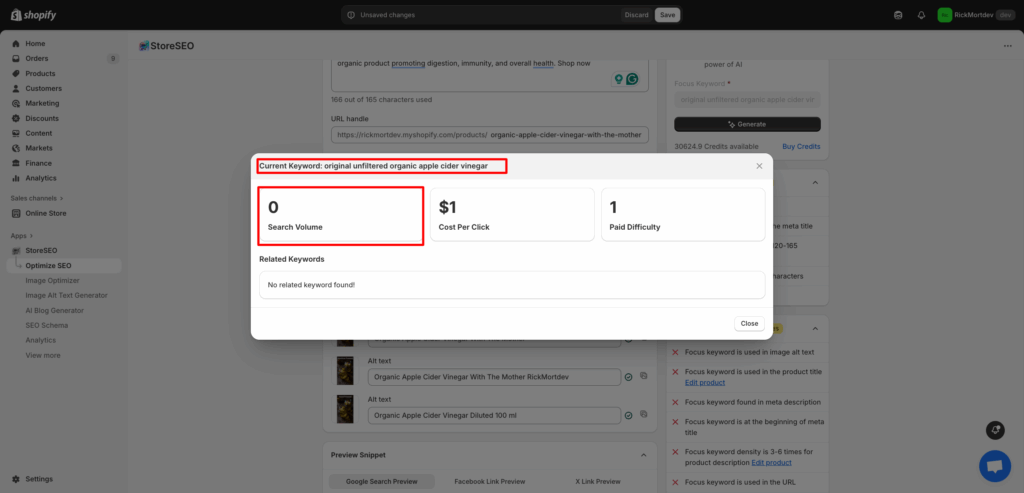
Wenn Sie nun ein kurzes Fokus-Keyword wie 'Apfelessig', werden Sie feststellen, dass es ein hohes Suchvolumen hat, wie im Bild unten gezeigt. Solche beliebten Schlüsselwörter haben jedoch zu viel Verkehr und es wird viel schwieriger sein, ein Ranking zu erzielen und Ihr Publikum zu erreichen.
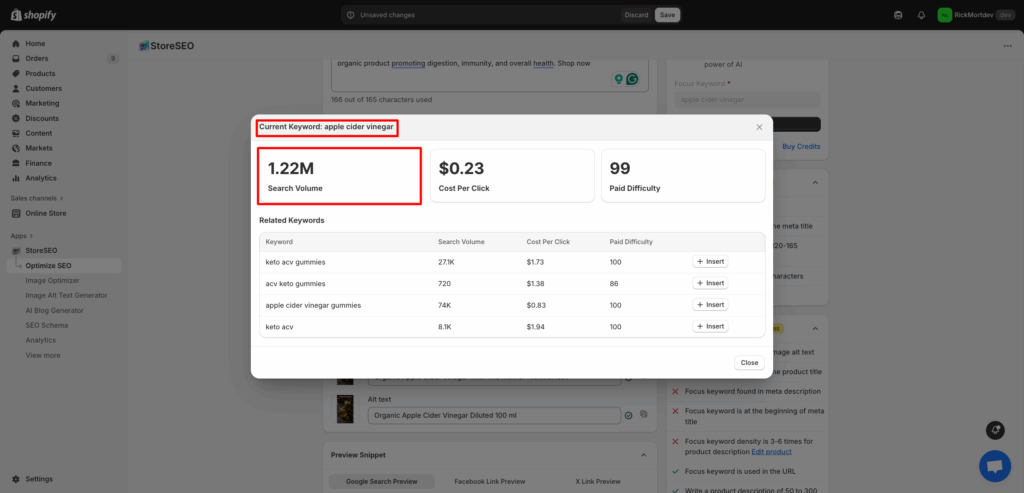
Wenn Sie dagegen das Fokus-Keyword 'Bio-Apfelessig', Sie haben ein gutes Suchvolumen (nicht zu hoch) und es besteht eine höhere Wahrscheinlichkeit, ohne große Konkurrenz indiziert zu werden. Deshalb ist dies in diesem speziellen Fall die geeignetere Fokus-Keyword-Option.
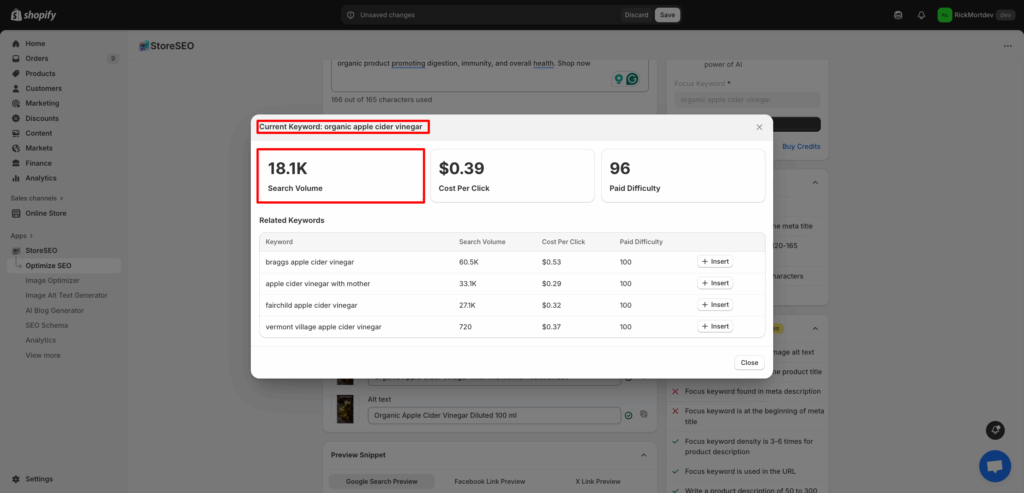
Kosten pro Klick: Wenn Sie Anzeigen mit bestimmten Schlüsselwörtern schalten, bestimmt der Preis pro Klick das ungefähre Budget für die Werbekampagne. Wenn Sie also Schlüsselwörter mit einem höheren Preis pro Klick wählen, bedeutet dies, dass Sie ein größeres Kampagnenbudget benötigen. Bitte beachten Sie, dass es sich um einen geschätzten Wert handelt und Sie müssen sich keine Sorgen machen, wenn Sie keine Werbung schalten.
Bezahlter Schwierigkeitsgrad: Dies stellt die Nachfrage nach Schlüsselwörtern dar, wenn sie in bezahlten Anzeigen verwendet werden. Eine höhere bezahlte Schwierigkeit weist darauf hin, dass das Schlüsselwort auch bei der organischen Suche mehr Konkurrenz hat. Es ist also eine wichtige Kennzahl bei der Schlüsselwortrecherche.
Verwandte Stichwörter: Denken Sie daran, die verwandten Schlüsselwörter für ein bestimmtes Schlüsselwort zu prüfen. Diese verwandten Schlüsselwörter geben Ihnen zusätzliche Schlüsselwortvorschläge. So stoßen Sie möglicherweise auf eine bessere Fokus-Schlüsselwortoption. Stellen Sie sicher, dass die verwandten Schlüsselwörter zu Ihrem Produkt, Ihrem Unternehmen, Ihrer Zielgruppe und Ihrer Nische passen.
Zurück zur Produktoptimierung auf StoreSEO, platzieren Sie Ihr bevorzugtes Keyword im 'Fokus KeywordKlicken Sie auf das Feld 'Keyword-Analyse'-Taste, um sofort die Suchvolumen, Kosten pro Klick, Bezahlter Schwierigkeitsgrad Und Verwandte Stichwörter für Ihr Schlüsselwort.
Hier haben wir ausgewählt 'Bio-Apfelessig' als Fokusschlüsselwort. Es wird empfohlen, für verschiedene Produkte unterschiedliche Fokusschlüsselwörter zu verwenden. Wenn Ihre Produkte jedoch alle ähnlich sind, kann für sie dasselbe Fokusschlüsselwort verwendet werden. Bitte wählen Sie ein Schlüsselwort entsprechend Ihrem Unternehmen. Keyword-Recherche für Shopify dafür.
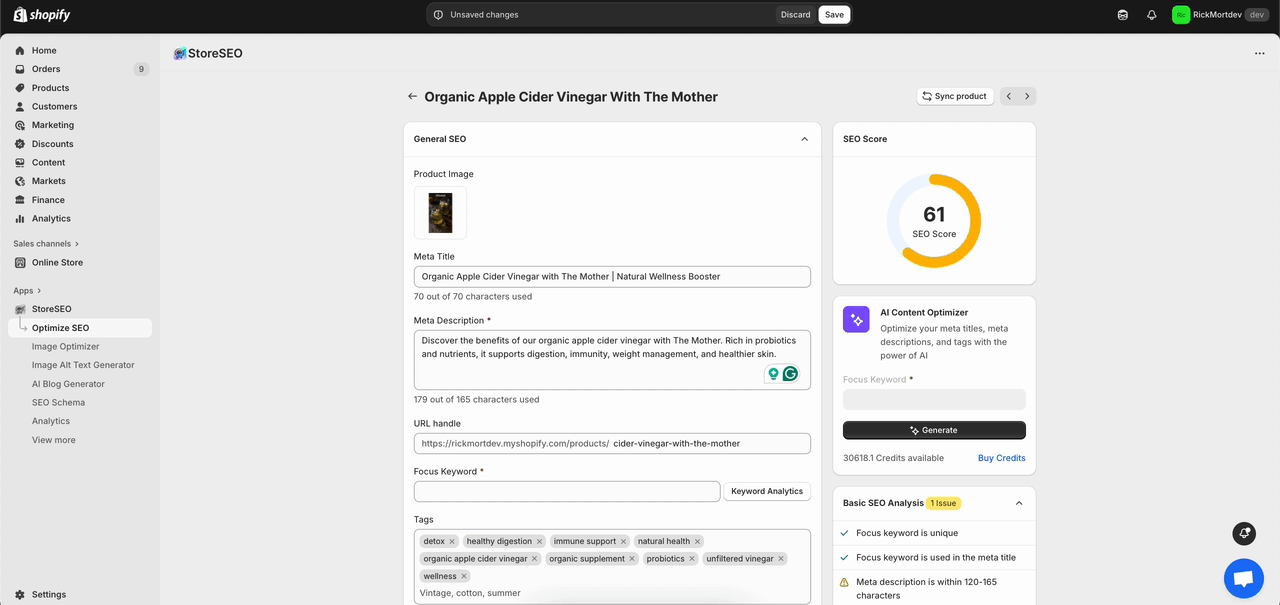
Fokus-Keyword wird im Meta-Titel verwendet #
Der Metatitel und die Metabeschreibung Ihres Produkts sind das Erste, was Kunden sehen, wenn sie Suchmaschinen durchsuchen. Daher sind beide sehr wichtig und sollten sorgfältig und richtig geschrieben werden. Stellen Sie nun sicher, dass das Fokusschlüsselwort im Metatitel verwendet wird. Wie Sie im Bild unten sehen können, lautet unser Metatitel wie folgt:
Bio-Apfelessig 100% Reines, natürliches, handgepresstes
Es enthält also unser ausgewähltes Fokus-Keyword (fett markiert).
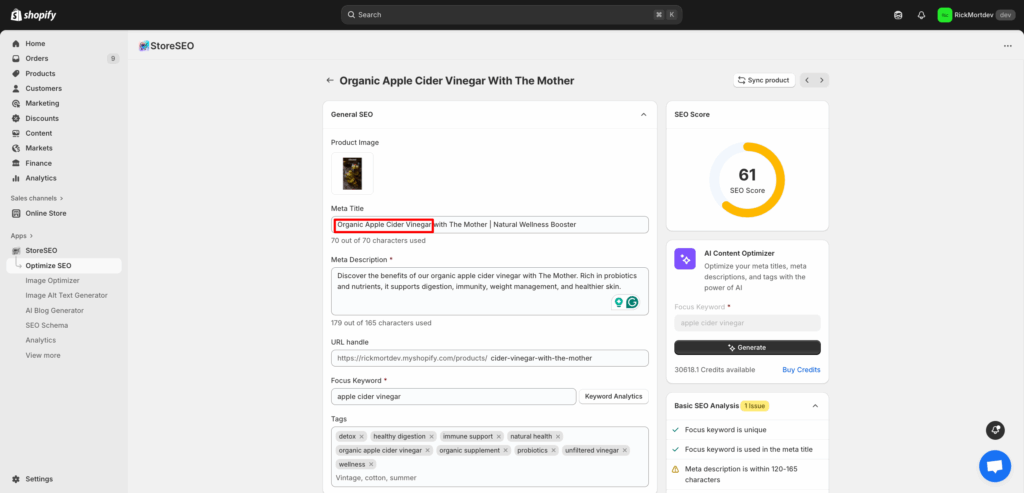
Die Meta-Beschreibung umfasst 120–165 Zeichen. #
Dein Meta-Beschreibung des Produkts sollte zwischen 120 und 165 Zeichen lang sein. Außerdem sollte es das von Ihnen ausgewählte Fokus-Keyword enthalten. Unsere Meta-Beschreibung lautet wie folgt:
Entdecken Sie die gesundheitlichen Vorteile unseres hochwertigen Bio-Apfelessigs. Ideal zur Entgiftung, Gewichtsabnahme und für das allgemeine Wohlbefinden. Holen Sie ihn sich jetzt zu einem unglaublichen Preis.
Wie Sie sehen, ist die Metabeschreibung 160 Zeichen lang und erfüllt somit die Anforderung, zwischen 120 und 165 Zeichen lang zu sein.
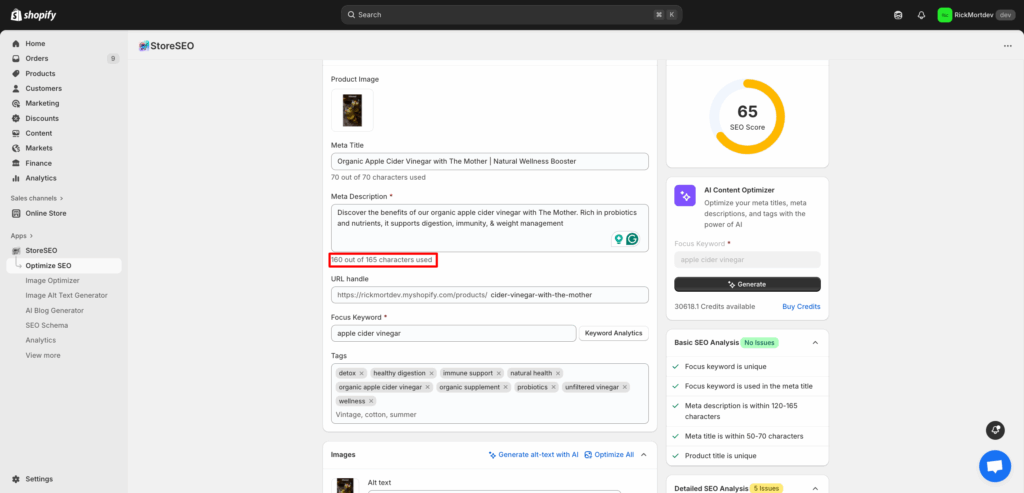
Der Metatitel besteht aus 50–70 Zeichen. #
Beschränken Sie Ihren Metatitel auf 50-70 Zeichen. Wie Sie sehen, lautet unser Metatitel wie folgt:
Bio Apfelessig 100% Rein natürlich handgepresst
Es ist 58 Zeichen lang und erfüllt somit die Anforderung.
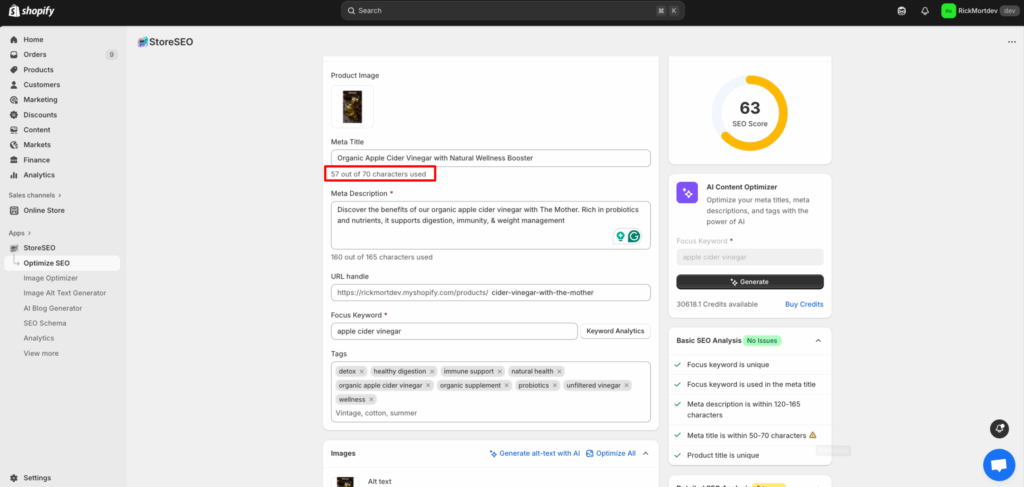
Der Produkttitel ist eindeutig #
Stellen Sie sicher, dass der Produkttitel eindeutig ist. Dies bedeutet, dass Sie nicht denselben Produkttitel für mehr als ein Produkt in Ihrem Shopify-Shop verwenden. Denken Sie daran, wenn Sie ein neues Produkt hinzufügen. Platzieren Sie außerdem Ihr ausgewähltes Fokus-Keyword im Produkttitel.
Wenn Ihr Fokus-Keyword nicht im Produkttitel vorkommt, wird in der detaillierten SEO-Analyse von StoreSEO ein Kreuz angezeigt. Klicken Sie also auf das 'Produkt bearbeiten' und bearbeiten Sie den Produkttitel aus dem 'Titel'-Feld. Stellen Sie sicher, dass der Produkttitel das Fokus-Keyword auf sinnvolle Weise enthält. Klicken Sie auf das 'Speichern'-Schaltfläche, wenn Sie fertig sind.
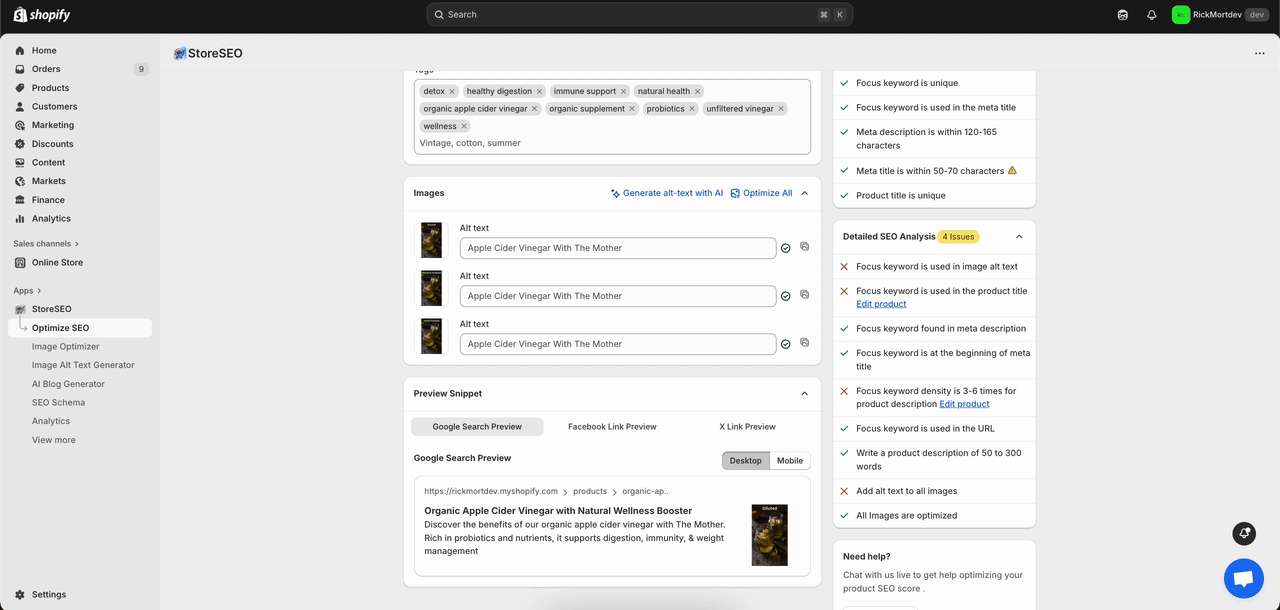
Wie Sie sehen, lautet einer unserer Produkttitel 'Bio-Apfelessig mit der Mutter', das in keinem anderen Produkttitel vorkommt. Es enthält außerdem unser ausgewähltes Fokus-Keyword.
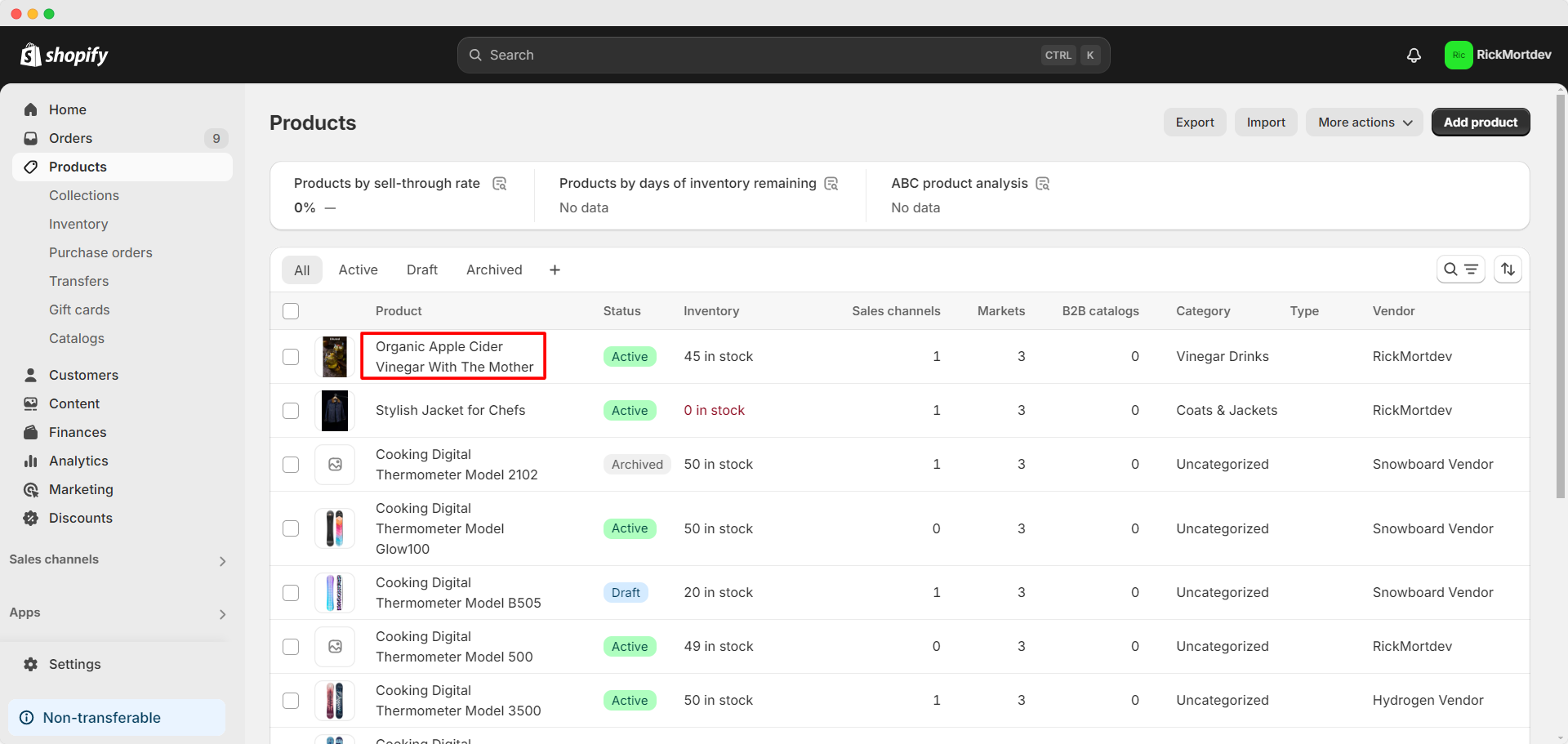
Detaillierte SEO-Analyse #
Wir werden nun fortfahren mit Detaillierte SEO-Analyse. Dazu müssen wir sicherstellen, dass das Fokus-Keyword im Alternativtext des Bildes, im Produkttitel, in der Meta-Beschreibung und in der URL platziert wird und einige weitere Anforderungen erfüllt. Wir zeigen Ihnen, wie Sie das alles erreichen.
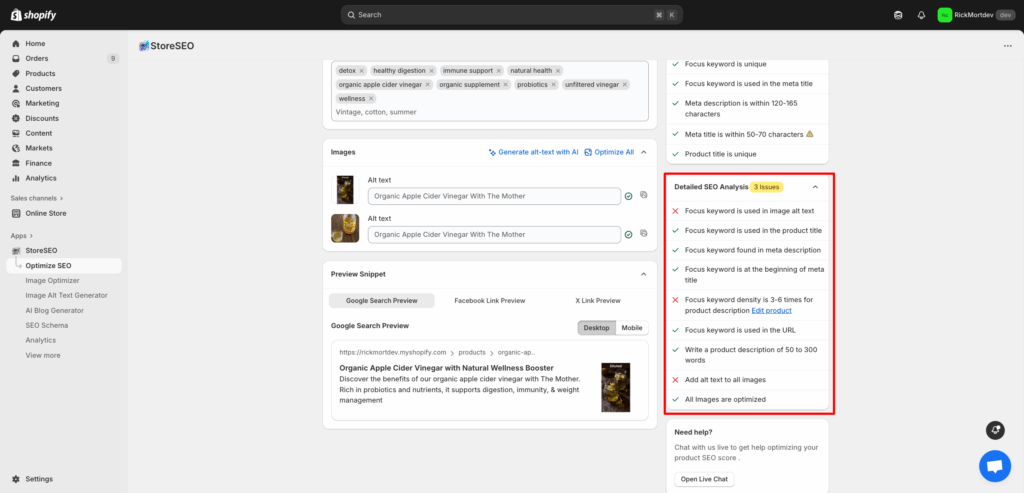
Das Fokus-Schlüsselwort wird im Alternativtext des Bildes verwendet #
Scrollen Sie nach unten und suchen Sie die 'Alternativtext' Felder. Stellen Sie hier sicher, dass das Schlüsselwort Fokus in den Alternativtext des Bildes. Wie Sie im Bild unten sehen können, enthalten alle unsere Alt-Textfelder Bio-Apfelessig (unser ausgewähltes Fokus-Keyword).
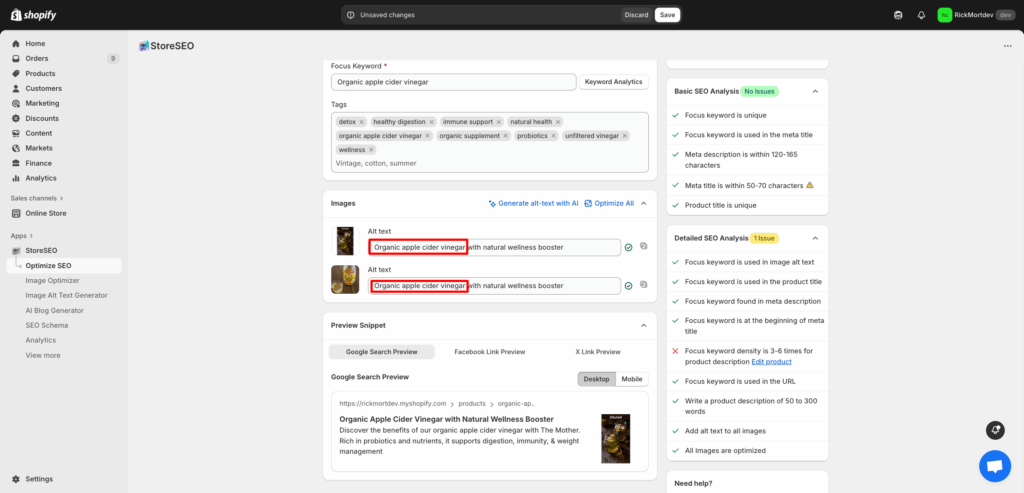
Fokus-Keyword wird im Produkttitel verwendet #
Wenn Ihr Fokus-Keyword nicht im Produkttitel vorkommt, wird in der detaillierten SEO-Analyse von StoreSEO ein Kreuz angezeigt. Klicken Sie also auf das 'Produkt bearbeiten' und bearbeiten Sie den Produkttitel aus dem 'Titel'-Feld. Stellen Sie sicher, dass der Produkttitel das Fokus-Keyword auf sinnvolle Weise enthält. Klicken Sie auf das 'Speichern'-Schaltfläche, wenn Sie fertig sind.

Wie unten gezeigt, enthält unser Produkttitel 'Bio-Apfelessig‘ welches unser ausgewähltes Fokus-Keyword ist.
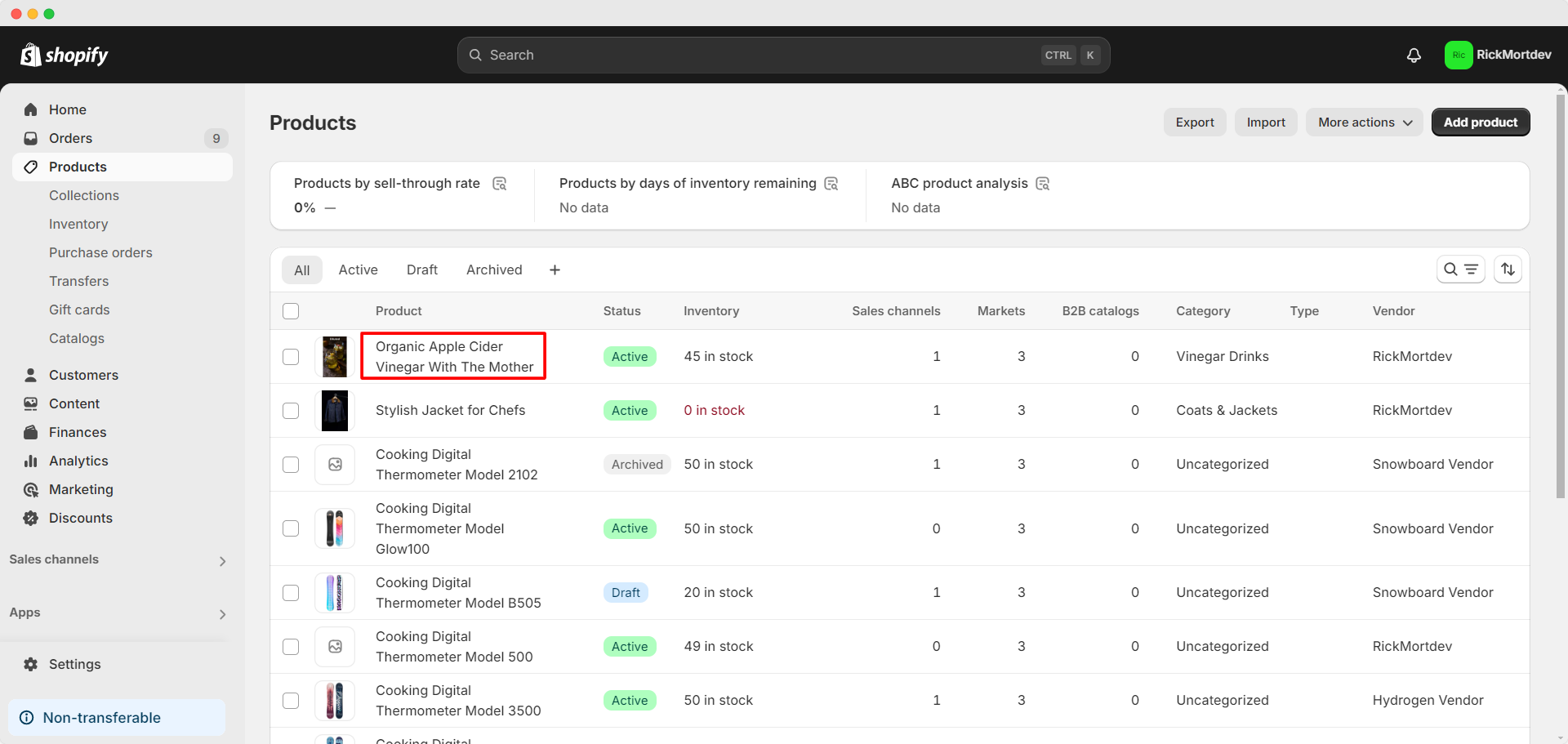
Fokus-Keyword in Meta-Beschreibung gefunden #
Wie wir bereits gezeigt haben, müssen Sie das Fokus-Keyword in die Meta-Beschreibung einfügen. Sie können es also noch einmal überprüfen, um sicherzustellen, dass Sie es getan haben.
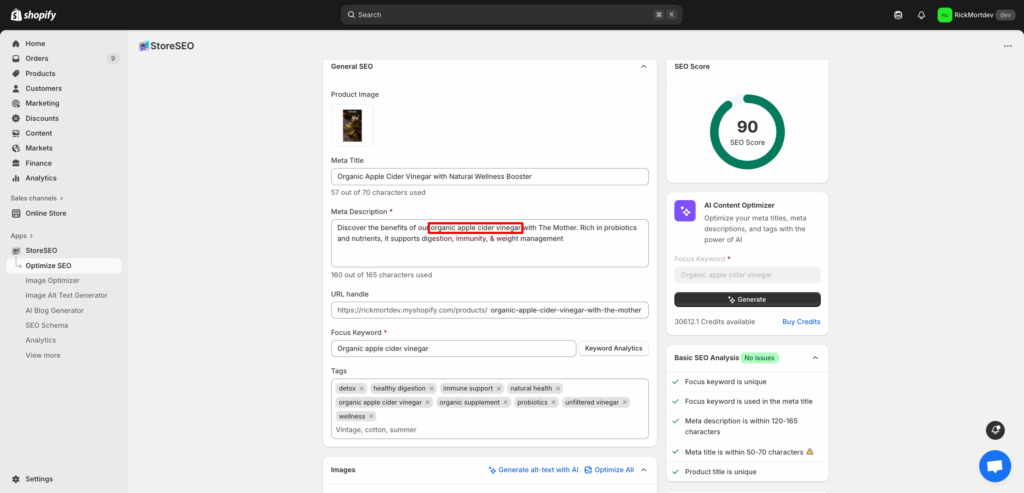
Fokus-Keyword steht am Anfang des Meta-Titels #
Stellen Sie nun sicher, dass das Fokus-Keyword am Anfang des Meta-Titels steht. Wie Sie im folgenden GIF sehen können, hat sich der SEO-Score dadurch deutlich verbessert.
Dies ist unser Meta-Titel:
Bio Apfelessig 100% Rein natürlich handgepresst
Wie Sie sehen, ist das Fokus-Keyword 'Bio-Apfelessig' wurde an den Anfang gestellt.
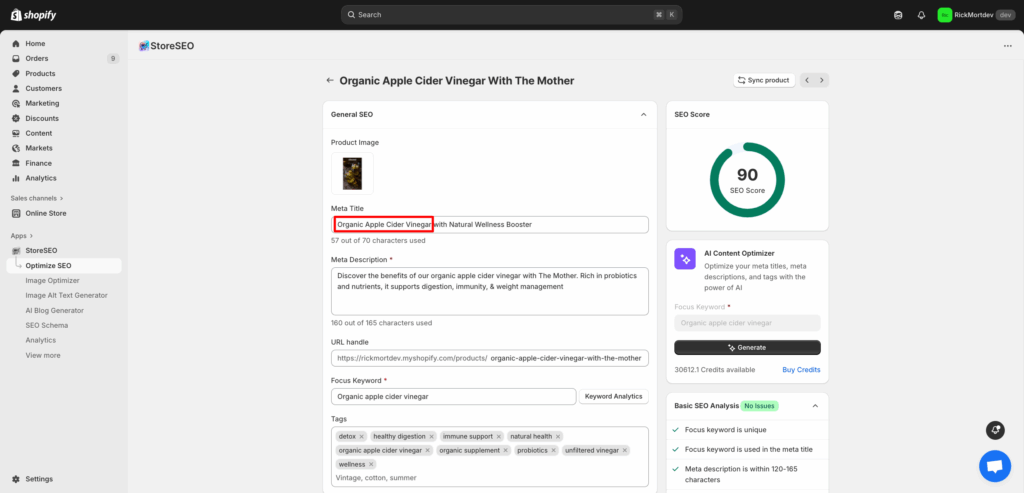
Die Fokus-Keyword-Dichte beträgt das 3- bis 6-fache der Produktbeschreibung #
Klicken Sie dazu im Shopify-Dashboard auf die Schaltfläche „Bearbeiten Produkte’ im Reiter „Detailanalyse“. Stellen Sie nun sicher, dass die Fokus-Keyword-Dichte 3-6 Mal in der Produktbeschreibung vorkommt, ohne dass Keyword-Stuffing erforderlich ist. Im folgenden Beispiel haben wir unser Fokus-Keyword 6 Mal verwendet:
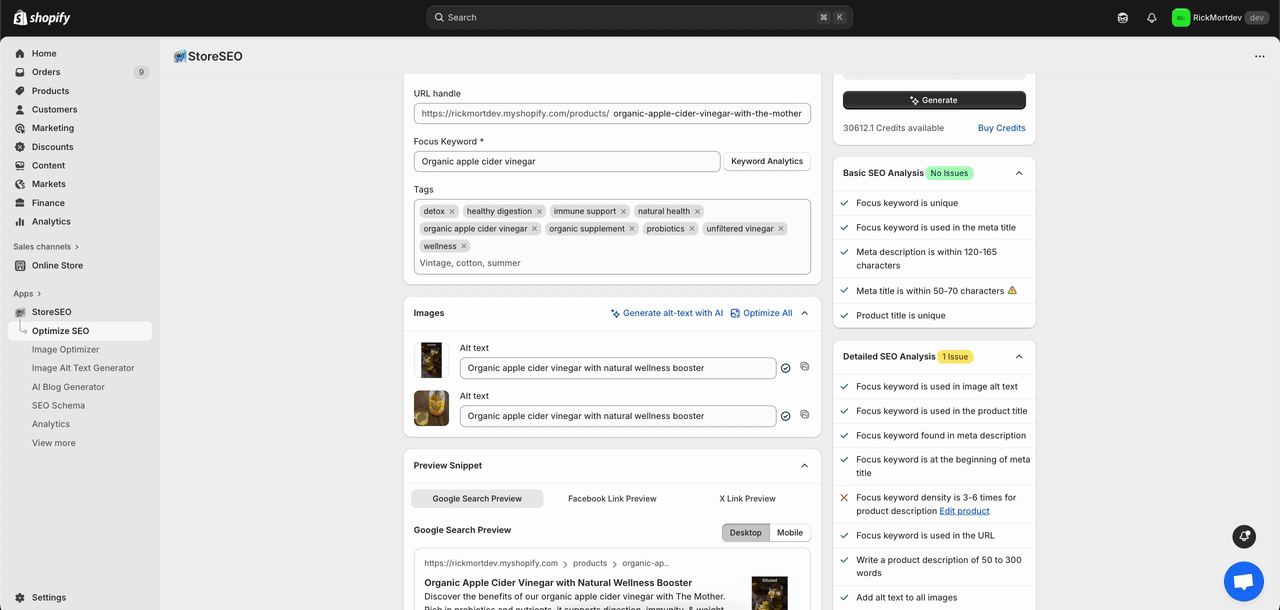
Fokus-Keyword wird in der URL verwendet #
Stellen Sie abschließend sicher, dass die Produkt-URL das Fokus-Keyword enthält. Wie Sie sehen, enthält das URL-Feld 'Bio-Apfelessig' oder unser ausgewähltes Fokus-Keyword.
Notiz: Wenn Ihr Produkt bereits indexiert ist und Sie dessen URL ändern möchten, empfiehlt es sich, eine URL-Weiterleitung einzurichten. Wir gehen davon aus, dass Sie einen neuen oder Ihren ersten Shop optimieren. In diesem Fall ist es am besten, keine unnötigen Weiterleitungen einzurichten.
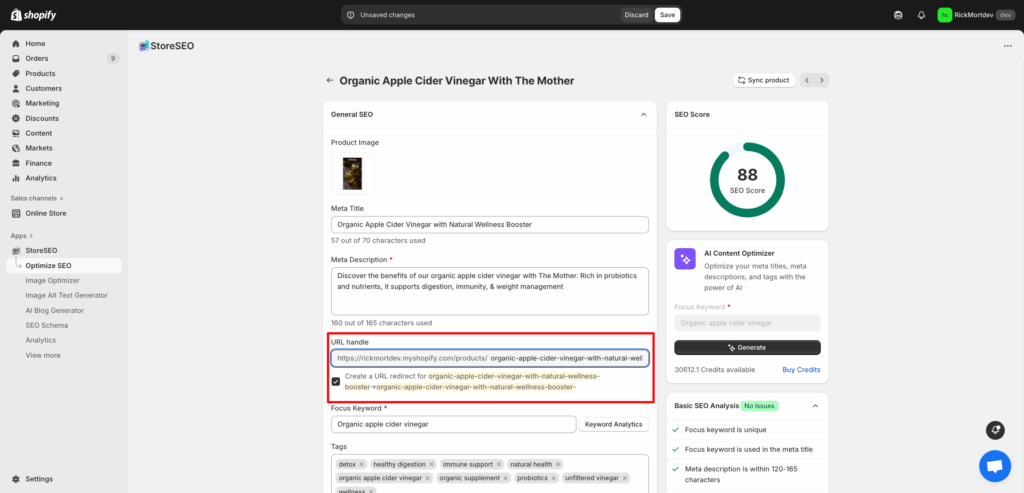
Schreiben Sie eine Produktbeschreibung mit 50 bis 300 Wörtern #
Stellen Sie sicher, dass die zuvor angezeigte Produktbeschreibung 50 bis 300 Wörter enthält. Wie Sie sehen, haben wir unsere Produktbeschreibung entsprechend geschrieben, um die besten SEO-Ergebnisse zu erzielen. Lesen dieser Blog um herauszufinden, wie Sie in Shopify einzigartige Produktbeschreibungen schreiben.

Fügen Sie allen Bildern Alternativtext hinzu #
Wenn Sie mehrere Bilder für Ihr Produkt haben, stellen Sie sicher, dass das Fokus-Keyword im Alternativtext aller Bilder verwendet wird. Wie Sie im Bild unten sehen können, haben wir unser ausgewähltes Fokus-Keyword im Alternativtext aller unserer Produktbilder verwendet.
Wir haben den folgenden Alternativtext für das Bild verwendet: Bio Apfelessig maschinengepresst 100 ml, Bio Apfelessig handgepresst 100 ml Und Bio Apfelessig verdünnt 100 mlAlle enthalten 'Bio-Apfelessig' oder unser ausgewähltes Fokus-Keyword.
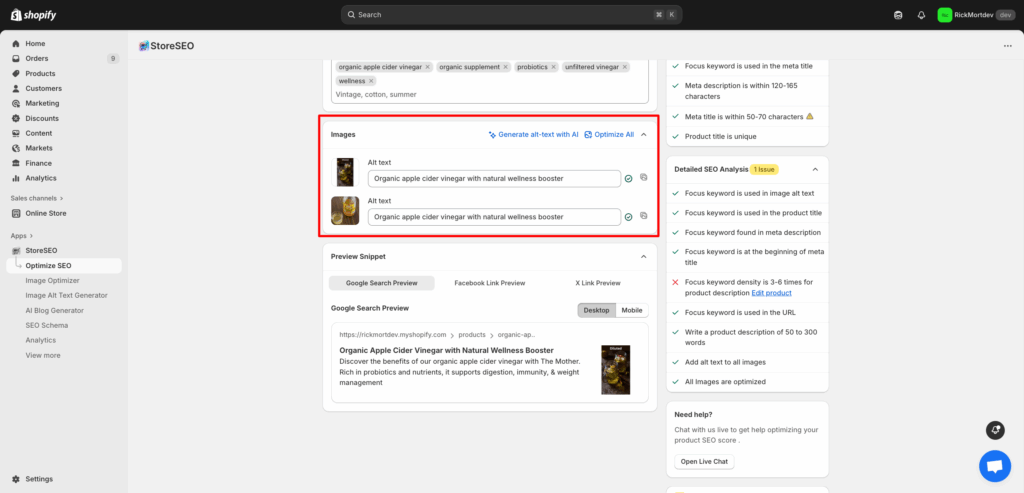
Alle Bilder sind optimiert #
Denken Sie daran, alle für das Produkt verwendeten Bilder zu optimieren. Mit StoreSEO können Sie Bilder auf Shopify optimieren mit Leichtigkeit. Wenn Sie ein Produkt mit StoreSEO optimieren, klicken Sie auf die Schaltfläche 'Optimieren' neben jedem Bild, um es individuell zu optimieren. Sie können auch auf die 'Alles optimieren', um alle Bilder auf einmal zu optimieren.
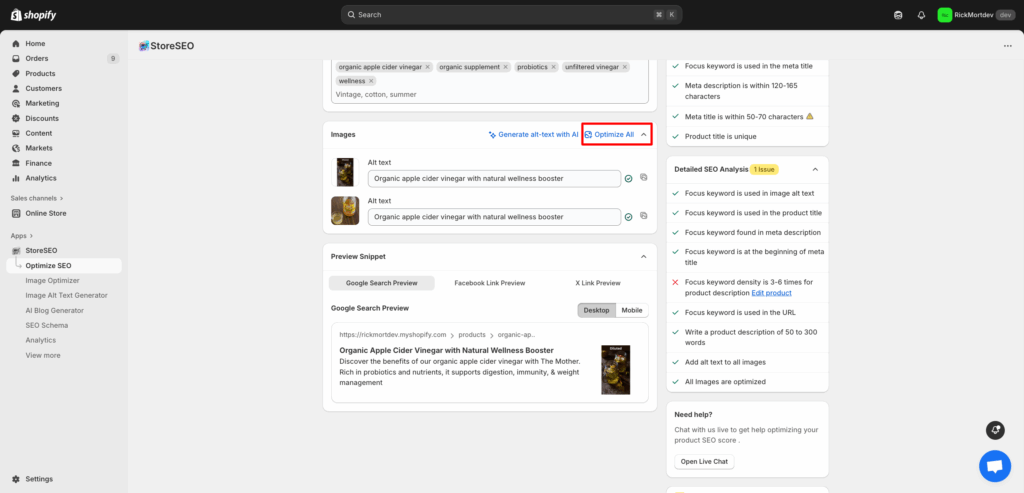
Um alle Bilder Ihres Shops an einem Ort zu optimieren, wählen Sie die Option 'Bild-Optimierer' unter StoreSEO in der linken Seitenleiste. Hier können Sie Bilder optimieren, optimierte Bilder auf das Original zurücksetzen und die wiederhergestellte und die Originalversion vergleichen unter Aktion wie unten gezeigt.
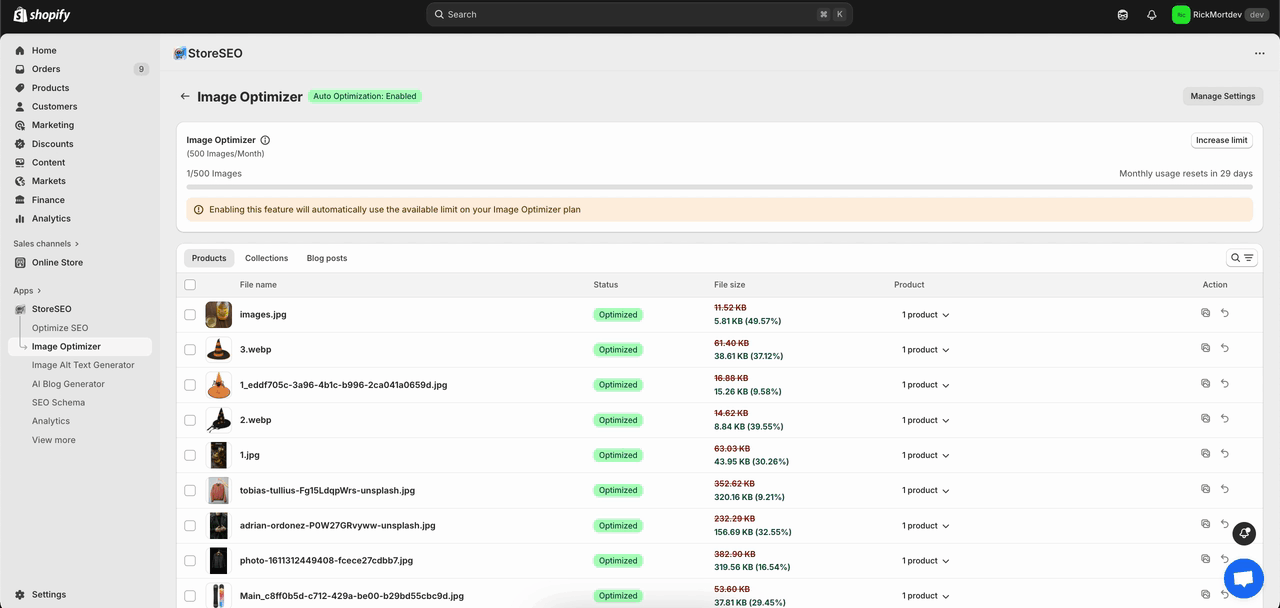
Für weitere Einstellungen klicken Sie auf das 'Einstellungen' in der linken Seitenleiste. Wählen Sie dann die 'Bild-Optimierer' Option. Aktivieren Sie 'Automatische Bildoptimierung', um Ihre Bilder beim Hochladen automatisch optimieren zu lassen. Sie können auch die gewünschten Bildkomprimierungs- und Bildformateinstellungen sowie die Ausgabegröße für das skalierte Bild auswählen. Klicken Sie auf die 'Speichern'-Schaltfläche, wenn Sie fertig sind.
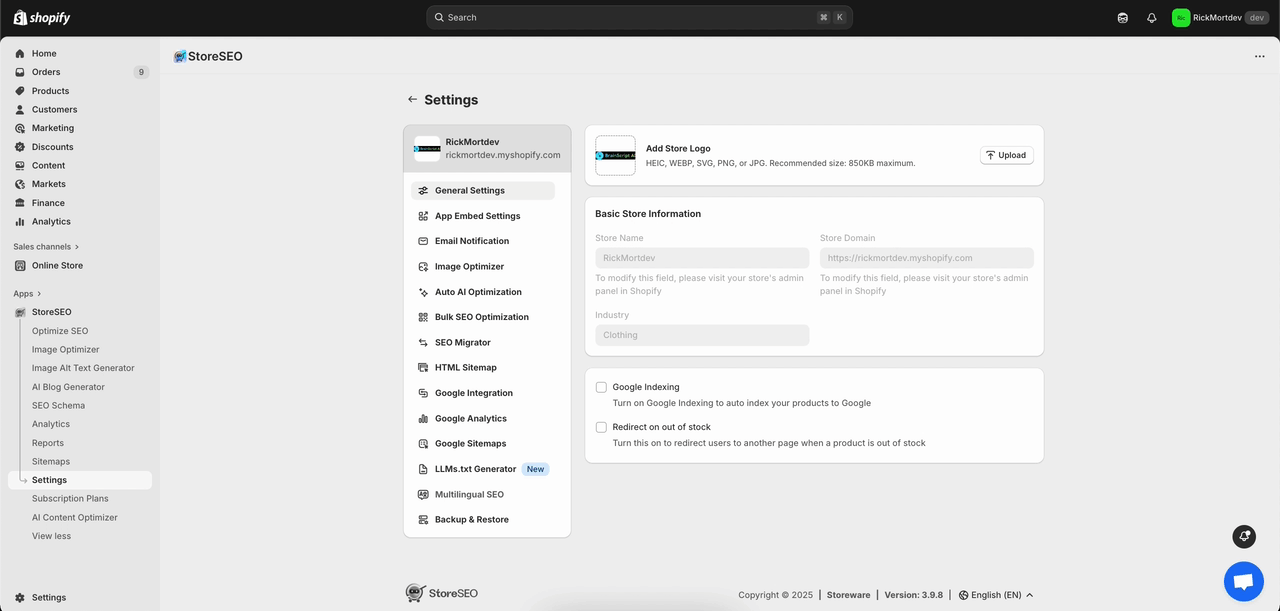
Indem Sie diese Schritte befolgen, können Sie jeden wichtigen SEO-Faktor berücksichtigen, um den bestmöglichen Optimierungswert für Ihre Produktseite zu erzielen. Wenn Sie Hilfe bei der Optimierung Ihres Inhalts für SEO benötigen, können Sie auch das StoreSEO AI Inhaltsoptimierer.
Wenn Sie mit der Produktoptimierung fertig sind und mit dem SEO-Gesamtergebnis zufrieden sind, klicken Sie auf „Speichern' Taste.
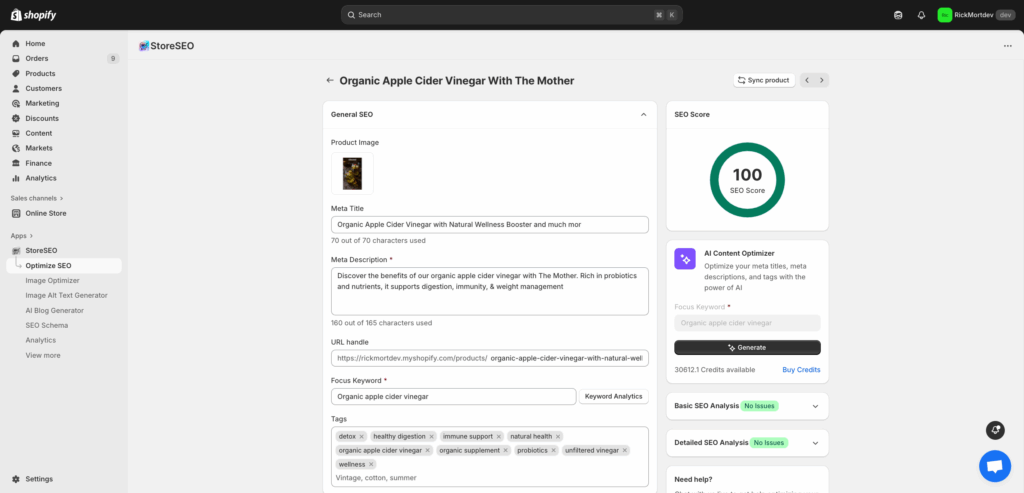
So einfach können Sie Shopify optimieren Produktseiten mit StoreSEO. Brauchen Sie Hilfe? Kontaktieren Sie uns gerne engagiertes Support-Team für jede Art von Abfrage.









